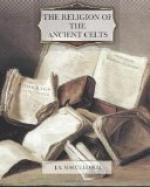Sensuous as many of the aspects of Elysium are, they have yet a spiritual aspect which must not be overlooked. The emphasis placed on its beauty, its music, its rest and peace, its oblivion, is spiritual rather than sensual, while the dwelling of favoured mortals there with divine beings is suggestive of that union with the divine which is the essence of all religion. Though men are lured to seek it, they do not leave it, or they go back to it after a brief absence, and Laeg says that he would prefer Elysium to the kingship of all Ireland, and his words are echoed by others. And the lure of the goddess often emphasises the freedom from turmoil, grief, and the rude alarms of earthly life. This “sweet and blessed country” is described with all the passion of a poetical race who dreamed of perfect happiness, and saw in the joy of nature’s beauty, the love of women, and the thought of unbroken peace and harmony, no small part of man’s truest life. Favoured mortals had reached Elysium, and the hope that he, too, might be so favoured buoyed up the Celt as he dreamed over this state, which was so much more blissful even than the future state of the dead. Many races have imagined a happy Other-world, but no other race has so filled it with magic beauty, or so persistently recurred to it as the Celts. They stood on the cliffs which faced the west, and as the pageant of sunset passed before them, or as at midday the light shimmered on the far horizon and on shadowy islands, they gazed with wistful eyes as if to catch a glimpse of Elysium beyond the fountains of the deep and the halls of the setting sun. In all this we see the Celtic version of a primitive and instinctive human belief. Man refuses to think that the misery and disappointment and strife and pain of life must always be his. He hopes and believes that there is reserved for him, somewhere and at some time, eternal happiness and eternal love.
FOOTNOTES:
[1231] Nutt-Meyer, i. 213.
[1232] Joyce, OCR 431.
[1233] D’Arbois, ii. 311; IT i. 113 f.; O’Curry, MC iii. 190.
[1234] Nutt-Meyer, i. 1 f., text and translation.
[1235] LU 120_a_; Windisch, Irische Gramm. 120 f.; D’Arbois, v. 384 f.; Gaelic Journal, ii. 307.




